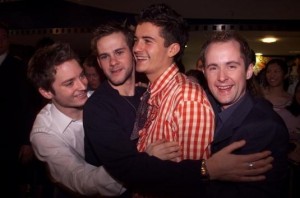 PARK CITY, Utah — Orlando Bloom
PARK CITY, Utah — Orlando Bloom is was at the Sundance Film Festival promoting “Sympathy For Delicious,” an independent film directed by Mark Ruffalo. Bloom, of course, was launched to fame by his turn as practically divine (looking) Elf Legolas in Peter Jackson’s film trilogy, “The Lord of The Rings.”
And without a doubt (besides the obvious and absolutely vital return of Gandalf to the silver screen) he is the member of the Fellowship of the Ring who should be in Guillermo del Toro’s two-part adaptation of “The Hobbit.” Here is why:
Every actor associated with Jackson’s films seems to get some variation of the red-carpet question, “Will you be in ‘The Hobbit’?” Elijah Wood, Dominic Monaghan, Billy Boyd, Sean Astin, Viggo Mortensen, and Liv Tyler among others have all been peppered by the media on the subject. The answer usually mentions a willingness to do so by the actor with profuse praise for Jackson and then the admission that it doesn’t make a lot of sense, in the context of the films, to do it.
In fact, such appearances would completely ignore continuity from J.R.R. Tolkien’s books and would also seemingly disregard Jackson’s films’ common sense where young Hobbits would be showing up decade’s before their own birth to make a cameo.
But Bloom certainly wouldn’t be too young if Legolas’s comments regarding his age are taken into account. The written Legolas, in one of several such bits of dialog contained in “The Two Towers” says, ” ‘Five hundred times have the red leaves fallen in Mirkwood in my home since then,’ said Legolas, ‘and but a little while does that seem to us.’ ” Film Legolas, based on absolutely nothing written by Tolkien, declares that he is 2,931 years of Sindarin hunkeyness old.
Tyler’s Arwen and Cate Blanchette’s Galadriel similarly have longevity on their side but those characters lack the historical probability of being in the right place at the right time to place them squarely in front of “The Hobbit,” cameras which weighs heavily in Bloom’s favor.
The MTV blog chatted Bloom up during his Sundance promotional efforts and got him to confess that he has already e-mailed Jackson telling him that he would be willing to return to New Zealand and step in front of cameras with a blond wig and pointy ears.
 MTV then writes a sentence that might get its Tolkien-credibility card revoked:
MTV then writes a sentence that might get its Tolkien-credibility card revoked:
“It’s not particularly likely that Bloom’s services would be required for “The Hobbit” as Legolas has no role in the original story, though it’s always possible that the actor could play Thranduil, Legolas’ father who appears as the Elvenking in the story.”
(Okay MTV blog folks, we are just kidding! Nobody wants to revoke that ‘imaginary’ card and we heart you for asking lots of ‘Hobbit’ questions at every turn.)
First, Bloom cannot, should not, must not, play Thranduil as it would take every viewer around the world out of the story immediately and doubly fast if / when his royal heart-throbness flexed his cheek muscles into a smile. (Although it is unknown if Thranduil so much as grinned.)
But more importantly, while Legolas didn’t expressly have a role in the original story, it is highly likely that he was present at some of the big events described there. Tolkien wrote “The Hobbit,” years before he completed “The Lord of the Rings,” so while the character of Legolas wasn’t mentioned by name, his name was in use in Tolkien’s (at the time) great unpublished mythos which became “The Silmarillion”. At the time of that writing the Good Professor had not yet tied “The Hobbit” to his epic creation but later when he wove the two together he pulled out and dusted off the Elvish name which means “Green leaf”.
In LOTR, Legolas is in Rivendell just in time for the Council of Elrond because he carried the news of Gollum’s escape from his father’s forest home. (You might imagine these Elves would have tightened dungeon security after 13 Dwarves snuck out, but apparently not!)
His mission to Elrond demonstrates that:
A) He was a trusted agent of his father (and a Prince)
B) He likely lived with his fellow Elves in Mirkwood
Eighty years prior to visiting Elrond and agreeing to represent Elves in The Fellowship, it is likely that Legolas was in Mirkwood with his father, probably advising dad and opposing the trouble brewing which was later shown to be Sauron hiding as The Necromancer.

Further, when an army of Elves were mustered to march to The Lonely Mountain for war in the Battle of the Five Armies, it seems unthinkable that Legolas wouldn’t be among their number if not leading them in some manner.
So while Legolas had no explicit role spelled out in the text, Princes of Mirkwood wouldn’t miss events like the notable capture of Dwarves or the restoration of his father’s honor and kingdom via war.
Now if it were up to me, Bloom would probably not speak a word in either of the two Hobbit films but would stand behind Doug Jones Thranduil silently supporting and honoring his father. He would definitely be present at the flicks’ biggest battle doing low-key but unmistakable Legolas moves.
I don’t know that Bloom would agree to a part with no dialog but if he would it would be a classic nod to his non-mention in the books while providing a line of continuity from del Toro’s films to Jackson’s. It wouldn’t require a large time commitment either and would likely delight studios and financiers. It wouldn’t be an over-the-top, distracting cameo but a tasteful, clever and humorous walkthrough that would also feel just ‘right’.
Opinions expressed belong solely to the author and not necessarily shared by TheOnering.net


